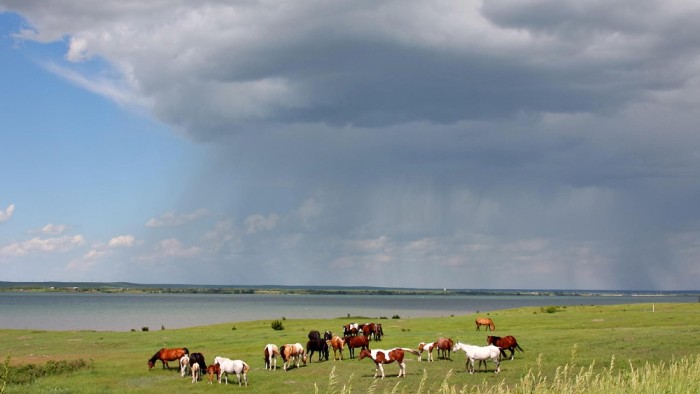Yale Forest Forum Highlights: Carbon Projects for Indigenous Forest Owners

In Brief
Forest carbon credits' value carries complex strings, especially on Native-owned land.
Facing the complexity as a cue for more sovereignty, the National Indian Carbon Coalition counsels Tribes and other Native population on carbon deals.
This event summary explains the organization's process and its progress.
This fall, the Yale Forest Forum is running a webinar speaker series, “What Makes a High-Quality Forest Carbon Credit?” This speaker series runs every Thursday from 11:30 – 12:10pm EST until December, 2022. Sessions are open to the public, and recordings are publicly available shortly after each presentation. To register or watch session recordings, click here.
On October 13th, Bryan van Stippen, Program Director of the National Indian Carbon Coalition, presented “Developing a Project for Indigenous Forest Owners.” This article summarizes his comments about one approach to using carbon credit agreements to increase Tribal sovereignty and control.
Van Stippen’s talk started with an assertion: it is critical that Tribal nations “not let their natural resource assets benefit others before they benefit their own communities.” The National Indian Carbon Coalition (NICC) views carbon projects as both economic development and natural resource stewardship opportunities. Due to histories of extraction and theft, he argued, carbon transactions on Tribally-owned land should address not just ecological outcomes, but also community economic development, land rematriation, and cultural preservation.
NICC can work on any land base on which the Tribe has ownership, including trust, fee, and allotted lands. NICC seeks to provide neutral information about carbon projects to Tribal members; work with non-profit and carbon developer partners to support scientifically sound carbon projects; and serve as an intermediary in credit sales. NICC supports development of forest carbon, soil carbon, and renewable energy credit projects. NICC is a project of two separate non-profits, the Indian Land Tenure Foundation and Intertribal Agriculture Council.
Collectively, Tribes own millions of acres of forest and grassland areas. However, their land ownership is often a complex checkerboard. It typically includes trust land (owned by the federal government on behalf of Tribes), fee simple land (owned outright by Tribal nations), and small parcels of land owned by individuals both Native and non-Native (sometimes Tribally-owned land is parcelized or fractionated as a result of generational transfer). Ownership of mineral rights and other natural resources can be severed from land ownership as a result of legally complex and often untoward histories.
NICC seeks to ensure that land tenure and sovereignty over natural resources (such as carbon) remain in the control of Tribes. To work respectfully within Tribal governance structures, Van Stippen mainly relies on Memorandums of Understanding (MOUs) and Non-Disclosure Agreements (NDAs) written with input from a specific Tribe, to ensure that individual Tribes can govern transmission of their information. Information about natural resources has historically been used by non-Tribal parties to exploit these resources. A typical carbon transaction does not have this same level of protection on information about carbon stocks or natural resources.
NICC hopes that carbon credits can respond to centuries of land theft and broken treaties by, for instance, steering revenues from carbon credit sales to re-acquire and restore Tribal ownership of traditional lands. Of course, NICC does not have any say in how revenues from a carbon sale will be used; that decision is solely in the hands of each individual Tribe.
As a Native-led organization, NICC works in ways that are sensitive to Tribal culture and norms. For instance, with each Tribe it encourages the formation of a carbon work team, composed of Tribal members, staff, and leadership. With the carbon work teams, NICC talks through details and risk factors in order to reach consensus. Formally, a deal does not go into effect before team members reach full consensus, and no external parties are brought into the conversation before this happens. After initiating a project, the National Indian Carbon Coalition seeks to represent Tribal values in negotiations. Van Stippen says this includes decision making authority over project partners and credit buyers, and technical support on reporting and paperwork throughout a project’s duration.
NICC funds itself through philanthropy and fees on each deal, but Van Stippen says he hopes that the majority of revenues from credit sales go to Tribal nations. NICC works with larger partners such as The Nature Conservancy, American Forest Foundation, and Arbor Day Foundation for technical and content expertise support, but these partners cover their own costs.
To date, NICC has primarily supported credit sales from improved forest management projects. However, they seek to develop new protocols to support the expansion of traditional land use practices while also quantifying the ecosystem benefits associated with converting and restoring land. Ecosystem service markets are a potential revenue source to finance Tribal land stewardship practices. For instance, with support from a USDA Conservation Innovation Grant, they seek to quantify and sell the credits associated with converting former cropland to grassland grazed by bison. Though there is anecdotal evidence of the positive ecological benefits of bison grazing, the associated carbon sequestration benefits have not been quantified. NICC intends to do this, thus creating new sources of revenue from sales of carbon credits associated with improved pasture management to increase the number of acres grazed by bison.
If you are curious to learn more, we encourage you to watch the full talk here. More information about NICC’s work is available at this site.